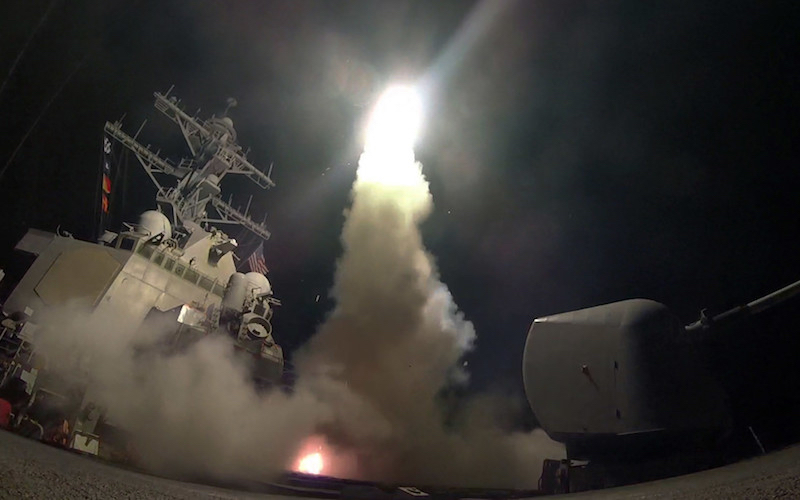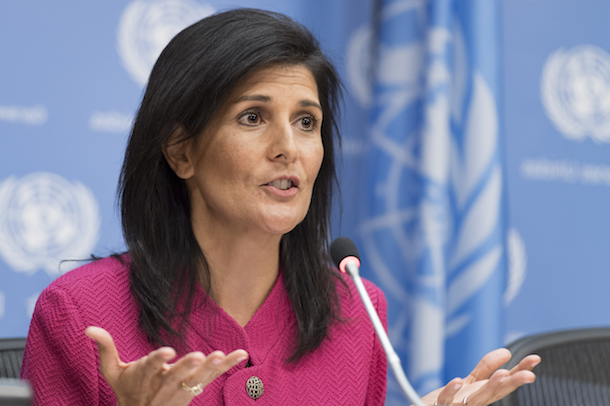
Policy on the Run: The U.S. Response to Idlib
After the latest tragedy in the ongoing Syrian tragedy Washington’s response is a pivotal one. The Assad regime lost its international legitimacy upon first using chemical weapons against its civilians in 2011. We are experiencing the U.S. making the obvious connection between a peaceful Syria and a Syria without Assad. The recent actions of the U.S. however are dangerous.
The Trump administration’s response has been ill thought out and potentially disastrous because it is unlikely that Russia and its allies will allow increased U.S. presence and engagement without retaliation. It is the first time during the Syrian conflict that the United States has directly engaged Assad’s forces, with the U.S.’s original objective being to eliminate the Islamic States presence in the region.
This response will see the U.S. quite literally fighting a war on two fronts. One against IS in North Eastern Syria and Northern Iraq whilst at the same time engaging in a shoot off with Assad’s forces. Russia’s response will be telling, if Putin chooses to retaliate we will witness potentially the greatest massacre of the post 9/11 era.
The latest atrocity carried out by the government forces took place in the North-Western province of Idlib, South of Aleppo. Horrifically killing more than 70 in a chemical gas attack – adding to the regimes ongoing list of war crimes – the Trump administration’s original response was, rightfully, one of total condemnation. This response firstly represents hypocrisy, as it is my belief that if Saudi Arabia were to use chemical weapons in Yemen tomorrow we would not witness the same U.S. backlash. Primarily, the response represents a shift in policy as it was only last week that the U.S. ambassador to the UN – Nikki Haley said that removing Assad was no longer a U.S. priority in Syria.
The subsequent response is what should terrify the international community. President Trump ordered an attack on the airbase that launched the chemical attack and called on “all civilized nations to join us in seeking to end the slaughter and bloodshed in Syria.” Escalation of the conflict will depend on firstly, the response of rival actors and secondly on whether or not the United States attacks will be sustained and thirdly which countries will heed the call of Trump and join the coalition.
Sean Spicer, the White House press secretary, was initially quick to point the finger at the Obama administrations inaction on its ‘red line’ policy. Clearly, the situation in Syria is not now what it was under Obama, however I believe Washington’s criticism is valid, albeit short-sighted.
It is not the role of the U.S. to perpetually act at the global police officer for three reasons 1) it only serves to create proxy wars with geopolitical rivals (such as Russia), 2) the policy objectives of future administrations provide a problem if they are at odds with the present and 3) after years of failed campaigns in the Middle East the U.S. lacks any credibility among the international community as a military problem solver.

Assad should have been dealt with in the early days – when Assad initially attacked peaceful protestors with chemical weapons. The United Nation’s Responsibility to Protect (R2P) could and should have been invoked to prevent the downward spiral into the war we are witnessing today.
This time has come and gone and we must regrettably recognize that the Syrian conflict will continue for the foreseeable future.
The current U.S. policy is unclear. We know that the U.S. wishes to topple the Assad regime but we do not know how committed they are to this objective. We do know however, that state building has historically never proven to be a successful policy objective. This places the international community – especially countries that Trump has called on – in a difficult position.
The only group that has proved to be worth supporting in the conflict is the Kurdish minority in northern Syria, who have successfully defeated IS in a number of key battles. The group however is under equipped, divided and lacks sufficient military training, making them inadequate to handle a battle against the Syrian state.
Even if some sort of Kurdish enclave were to be carved out in the North this would not provide a long-term solution to the violence for a number of reasons. Firstly, this would create a backlash from Kurds in other parts of the Middle East, namely Iraq and Iran regarding their claims to statehood. Secondly, if and when the conflict comes to an end the Syrian government would undoubtedly want this land back – providing the reason for a new civil war and thirdly, under no circumstances would the Turkish government tolerate a Kurdish state on their Southern border.
My policy proposal is as follows, create a safe zone through the use of UN peacekeepers and U.S. forces in the Kurdish occupied regions of northern Syria. Here, refugees can be protected until such time that Assad is dealt with, at which point the region would be handed back to a Syrian government. This region would be defended by any means necessary from Russian, Iranian, Syrian and Islamic State aggressors. Clearly, this would create a backlash form the Turkish government – however I believe that threatening Turkey with expulsion from NATO would provide reason enough for it to temporarily tolerate such an operation, given the volatility of the region. Clearly, this will not eventuate and it would require unprecedented cooperation between state and non-state actors. However, we can acknowledge that the current policy is even more utopian.
The number of actors and separate competing interests in Syria has provided a recipe for the tragedy of our time that we see today. We are yet to witness the full force of the United States military in Syria and to this end we can be thankful. We can only hope that the recent escalations will not lead to such ends.
For the time being the future of the conflict is in the hands of rival actors. However, in the long term it is in the hands of the Syrian government. This is why it is essential (and paradoxical) that Assad be dealt with if we wish to witness peace. But peace is impossible if the U.S. continues its policy of military engagement.
It is always important to remember that history will be the final judge and at this point she is unlikely to absolve any of the conflict’s actors. But for the sake of the people trapped within Syria’s borders and for peace in the wider region it is critical that the right kind of action is taken.
